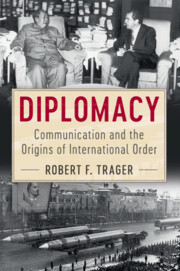1 - Can Adversaries Communicate?
Published online by Cambridge University Press: 25 October 2017
Summary
The relationship between Austria and Russia was without hint of conflict in the first half of the nineteenth century. Austrians wept with joy when Russia offered military assistance against the Hungarians, and the Austrian Emperor traveled to Warsaw, where he knelt on one knee to kiss the Tsar's hand. The two powers signed an agreement to conduct their foreign policies “only together and in a perfect spirit of solidarity,” and the Tsar told foreign diplomats, “when I speak of Russia, I speak of Austria as well.” Yet, in the latter half of the nineteenth century, the two empires were in constant tension, and often directly at odds. Russia offered aid and support against Austrian interests, first to Sardinia and Prussia, enabling those states to form Italy and Germany, and later to Serbia and other Balkan powers, leading to the World War. This dramatic shift in Russian policy towards Austria happened suddenly in the 1850s and did not result from changes in national capabilities or material interests; what brought it about?
Another important shift in European politics occurred during the Great Eastern Crisis in 1876. Germany and Russia had previously had the closest of relations, while Germany and Austria had fought a war a decade before. Yet, during the Great Eastern Crisis, a rift formed between Germany and Russia, while Germany and Austria–Hungary drew closer together. The German statesman, Otto von Bismarck, was convinced that the words his ambassador to Russia had uttered to the Tsar had brought about this “new situation” in Europe. Soon after, Germany signed the alliance with Austria that lasted until both Empires were destroyed fighting side by side in the cataclysm of the First World War. What did produce this new situation and how did it then convince Germany and Austria to bind themselves in a rare, permanent alliance despite having recently fought each other in a war?
The twentieth century contains many examples of similar shifts in leaders’ beliefs and policies with lasting consequences. At the turn of the century, for instance, Russo-Austrian relations were merely conflictual, but by 1914, the Austrian emperor had come to believe that Russian policy aimed at “the destruction of my empire.” Austrian statesmen, who had previously rated Germany an unreliable ally, came to believe instead during the July Crisis that Germany could be relied upon in an existential struggle.
- Type
- Chapter
- Information
- DiplomacyCommunication and the Origins of International Order, pp. 1 - 21Publisher: Cambridge University PressPrint publication year: 2017



